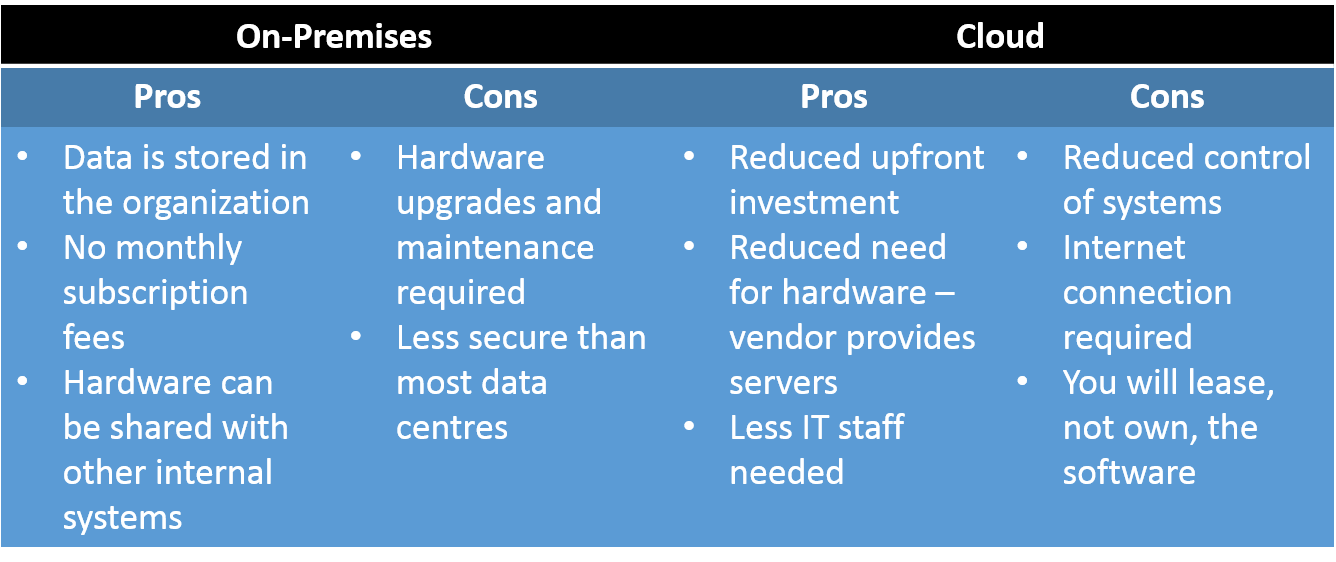Investing in ERP software is a huge decision for a company of any size. Moving from manual processes or an introductory system such as QuickBooks to completely automated, sophisticated practices can be a costly, time-consuming, and often confusing, decision-making process. So where should you start? Consider this list of basic questions to ask yourself…
Cloud or On-Premises?
Today, one of the biggest decisions facing companies regarding ERP implementations is whether to run the system on-premises or as a hosted solution. There are pros and cons to each option – it really does depend on your business model and needs. Here’s a brief look at some of the differences:
There is no “right answer” when it comes to choosing between on-premises or cloud, so just be sure to do your research! (Of course the software suitability and vendor's service level are even more important). Consider looking at a provider who will offer both, so your company has more flexibility to make a decision, will be given unbiased recommendations, and has the option of moving from one to the other.
Do you need all the bells and whistles to start?
When replacing software like QuickBooks, you may have big dreams of advanced functionality right off the bat. Although there are many benefits to these more sophisticated components, keep in mind that many vendors provide base functionality with additional components at a cost. Don’t forget – there are a LOT of efficiencies you will gain right from the start when upgrading to a proper system, even before adding in all the bells and whistles. Try to spend the time speaking with vendors who are transparent about what functionality your company can benefit from, and will help you objectively assess measurable improvements you're seeking. Avoid “traditional” sales people who focus on up-selling the product.
How many vendors should you evaluate?
Although there is no set number of vendors that your company should be evaluating, short-listing vendors after initial discussions to a handful – between 2 and 4 – is best in order to avoid becoming overwhelmed with choice. Here are a few things to keep in mind about the risks of evaluating too many vendors:
- It becomes tough to distinguish between vendors and their offerings: ERP software demos can take hours, so try not to clog your mind. Instead, keep the number of demos low and spread them out over a few days, leaving time in between each to discuss and record notes.
- It wears down resources and employees: Again, it is a time-consuming process!
- It usually delays the decision-making process: The information overload leaves decision-makers feeling overwhelmed, so they often just “choose not to choose”.
Before you begin discussions with vendors, spend some time preparing a list of your requirements, determine where there are opportunities for measurable improvement, and involve the right people in the process. Diving a little bit deeper into this, when evaluating the handful of vendors that you choose to short-list, there are some major considerations to keep in mind such as; customer satisfaction, company size, sales process, support, on-going dependability, and costs. Although software functionality is a very important decision-making criterion, consider these other 6 factors to make the right choice for your company.
Whether you're looking to replace QuickBooks, upgrade your inventory management system, reduce your accounting paperwork, or better manage your sales and distribution, there are many ERP options available to you. Make sure you do your research before committing to a company. Choosing between hosted or on-premises, deciding which features you need, and carefully narrowing it down to just a handful of vendors are just a few steps you should take. When you pick an ERP provider, you are picking a long-term business partner, so be sure not to rush the decision-making process, and to consider all factors that will affect the relationship.












